Herb gardening can be a fun and rewarding experience. However, it is essential to avoid common mistakes that can delay the growth and health of your plants. Remember that each herb has its own specific needs regarding light and care requirements. By taking note of these needs and avoiding common mistakes, you’ll have a thriving herb garden full of fragrant aromas, delicious flavors, and beautiful foliage.
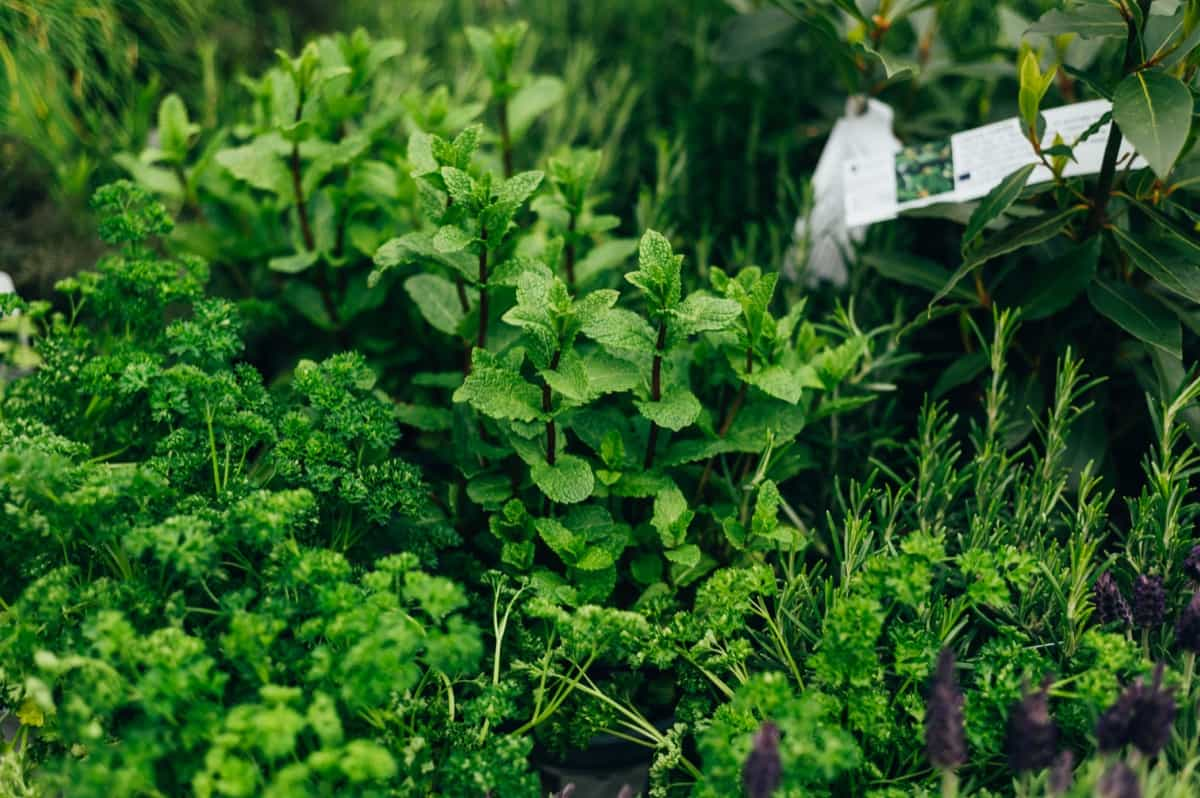
10 Common Herb Gardening Mistakes
Choosing Unhealthy Herb Plants
When starting an herb garden, choosing healthy plants that will thrive in your environment is essential. One of the most obvious signs is yellowing or wilted leaves. This could signify disease or overwatering. Another thing to consider when choosing herb plants is whether they are root-bound.
If the roots are tightly packed in their container, it can hinder their ability to absorb water and nutrients from the soil. Look for plants with loose, healthy-looking roots instead. Inspecting the foliage for pests such as aphids or spider mites is also important. These insects can quickly spread and damage your other herbs too.
Planting Herbs in the Wrong Environment
When starting an herb garden, the most common mistake is planting herbs in the wrong environment. Many people make this mistake by assuming all herbs require the same growing conditions. Each herb has its own light, temperature, soil type, and moisture level preference. Basil loves warm weather and ample sunlight, while Thyme prefers cooler temperatures with partial shade. Therefore, it’s important to research each plant before planting them together.
In case you missed it: Top 16 Perennial Herbs You Can Plant Once and Enjoy for Years
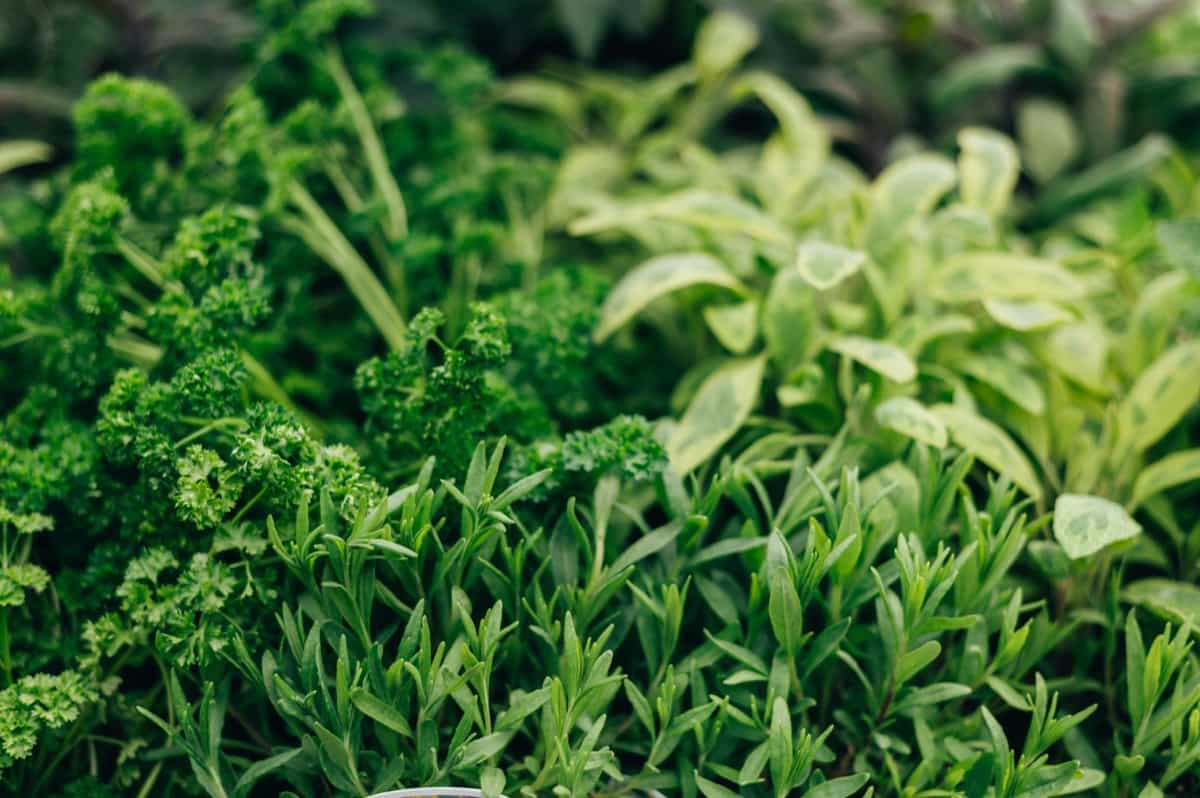
Another factor to consider is whether you plant your herbs indoors or outdoors. Indoor plants have different needs than outdoor ones since they often receive less sunlight and may not have access to natural pollinators like bees or butterflies. It’s also crucial to consider your region’s climate before choosing which herbs to grow since some may not thrive in certain areas due to extreme temperatures or humidity.
Many beginners often underestimate how much sunlight their herbs need. They assume that since they are growing indoors or on a shaded patio, they don’t require as much light as outdoor gardens. Most herbs need 6 hours of direct sunlight daily to thrive. If you’re keeping your herb garden indoors, place it near a sunny window for optimal results. If you’re growing outdoors, choose a spot with plenty of sunshine throughout the day.
Each type of herb has varying needs regarding sunlight. Some prefer full sun, while others do better in partial shade. Do some research on each plant you want to grow so you know exactly what kind of lighting conditions they require. Don’t let a lack of sunshine be the downfall of your herb garden. Ensure you provide your plants with enough light to flourish and provide fresh ingredients for all your culinary creations.
Cutting Back Too Little
Cutting back your herbs is essential to ensure healthy growth and maintain their shape. However, one of the most common mistakes gardeners make is cutting back too little. It might seem like you’re doing the right thing by sparing your plants from pruning, but it can cause many problems. One issue when you don’t cut back enough is that some herbs tend to become leggy or spindly.
This happens because they divert all their energy towards growing taller instead of developing more leaves and becoming bushier. Another problem with not cutting back enough is that it can lead to overcrowding. Plants growing taller without pruning properly may block sunlight for other surrounding plants. This can stunt the growth of those other plants and eventually kill them off.
In case you missed it: Top 10 Fast-Growing Herbs You Can Grow from Seeds
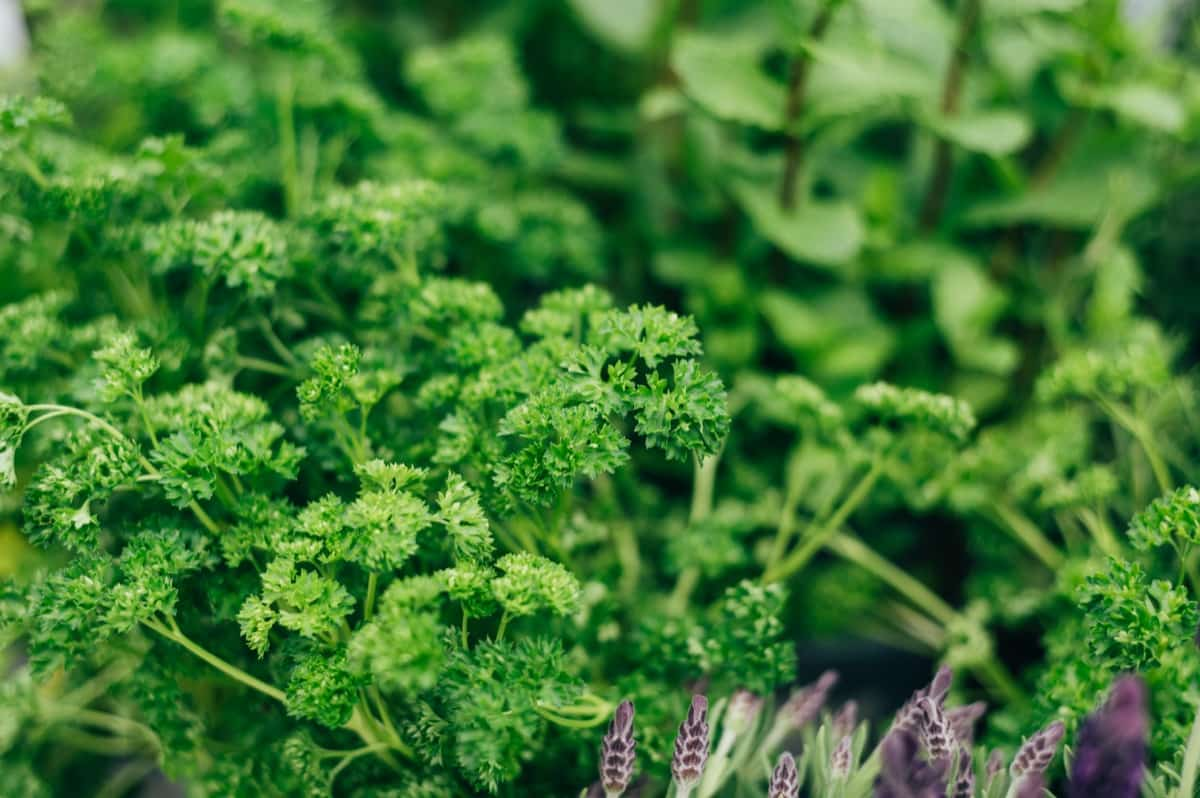
Moreover, failing to prune regularly could result in an overgrowth of dead branches or stems on your plant, which ultimately will attract insects or disease-causing organisms leading to stunted growth or even death. Therefore, it’s crucial to keep up with trimming your herb garden frequently so as not only to control its size but also to promote new leafy shoots.
Overcrowding or Planting Incorrectly
Overcrowding or planting herbs incorrectly is a common mistake beginner, and experienced gardeners make. It can lead to stunted growth, nutrient deficiencies, and even death of the plants. When planting herbs, it’s important to consider each plant’s needs for spacing and sunlight. Overcrowding causes competition for water, soil nutrients, and sunlight, resulting in unhealthy herb plants. Some herbs require more space than others due to their root systems or size when fully grown.
For instance, basil needs at least 12 inches between each plant, while mint requires more than two feet apart from other plants. Planting herbs too close together will not allow them enough room to grow properly, leading them to be cramped, ultimately affecting their health negatively. Additionally, planting certain herbs together may cause problems because they might need different sun exposure levels or incompatible soil pH values. Therefore, always read up on a particular herb before deciding where to plant them in your garden bed.
Allowing Flowers to Turn to Seeds
Allowing flowers to turn into seeds is a common mistake among herb gardeners. When herbs are allowed to flower and produce seeds, they put all their energy into seed production instead of growing new leaves or stems. This causes stunted growth and reduced yield. Additionally, some herbs become bitter or lose their flavor once they have gone to seed.
It’s important to regularly prune your herb plants to prevent this from happening. As soon as you see buds forming on the plant, pinch them off before they have a chance to bloom. Keeping your herb plants well-pruned and preventing them from flowering too early ensure they continue producing fresh leaves and stems throughout the growing season.
Spraying Chemicals onto Herb Plants
One of the biggest mistakes that herb gardeners make is spraying chemicals onto their plants. It can harm your herbs in the long run. Chemical sprays can kill off beneficial insects and pollinators and contaminate soil and water sources. Additionally, some chemical sprays may be unsafe for consumption if you use your herbs for cooking or medicinal purposes.
Instead of relying on harsh chemicals, try natural solutions such as companion planting or making homemade pest repellents with essential oils. Proper watering techniques and healthy soil can help prevent many common issues that would otherwise require chemical intervention. Avoiding chemical sprays in your herb garden will lead to healthier plants and a safer environment for you and your local ecosystem.
In case you missed it: Secret Tips to Create the Most Fragrant/Aromatic Herb Garden
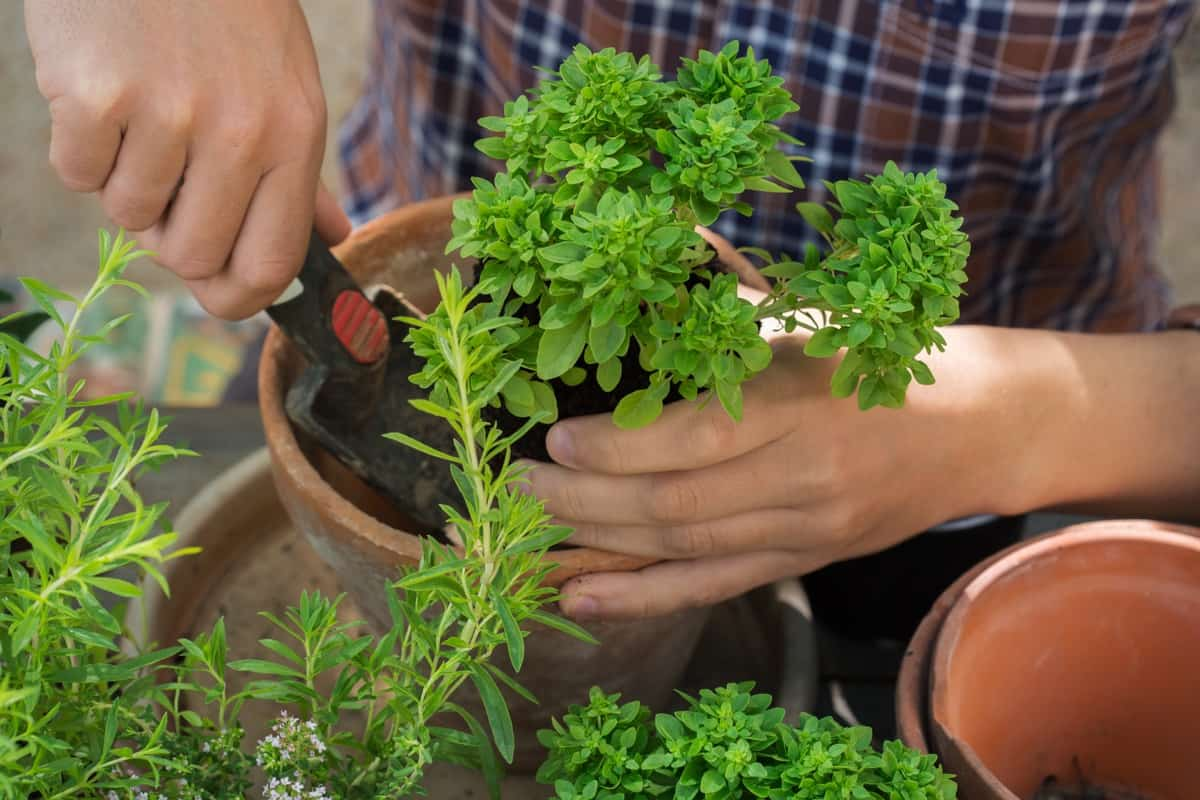
Watering Improperly
Watering your herb garden may seem simple, but it’s one of the most common mistakes beginners make. Underwatering or overwatering can both be detrimental to the health of your plants. One mistake many people make is not watering their herbs enough. Herbs need consistent moisture to thrive, and they may wilt or die if they don’t get enough water.
Check the soil and water it when dry about an inch below the surface. On the other hand, overwatering can also be harmful to your herbs. If their roots are constantly sitting in wet soil, they can develop root rot or other fungal diseases. Ensure your pots have drainage holes, and avoid letting them sit in standing water.
Another factor to consider is how you’re watering your herbs. It’s best to use a gentle stream of water from a watering can rather than spraying them with a hose or sprinkler system, which could damage delicate leaves. Proper watering techniques are crucial for healthy herb growth, so you find a balance between underwatering and overwatering.
Lack of Protection
Lack of protection is a common mistake that many herb gardeners make. This can be exposed to harsh weather conditions or pests and animals that can damage the plants. The most important aspect of protecting your herbs is providing adequate shelter from the elements. If you live in extreme temperatures or frequent storms, providing some form of cover for your plants is essential.
You could use a greenhouse, cloches, or shade cloth to protect them. Another way to protect your herbs is by installing barriers around them. This will prevent animals like rabbits and deer from eating them. You could use chicken wire, fencing, or other suitable materials. It’s also crucial to watch for any signs of disease or pest infestations on your plant leaves and stems.
By Catching these issues early, you can prevent further damage and allow you to act quickly. Lack of protection can lead to significant losses in time investment and money spent buying new plants. Therefore, it’s essential always to be vigilant about providing necessary care measures to enjoy healthy herb yields season after season.
In case you missed it: How to Grow and Care for Epazote Herb in Your Garden
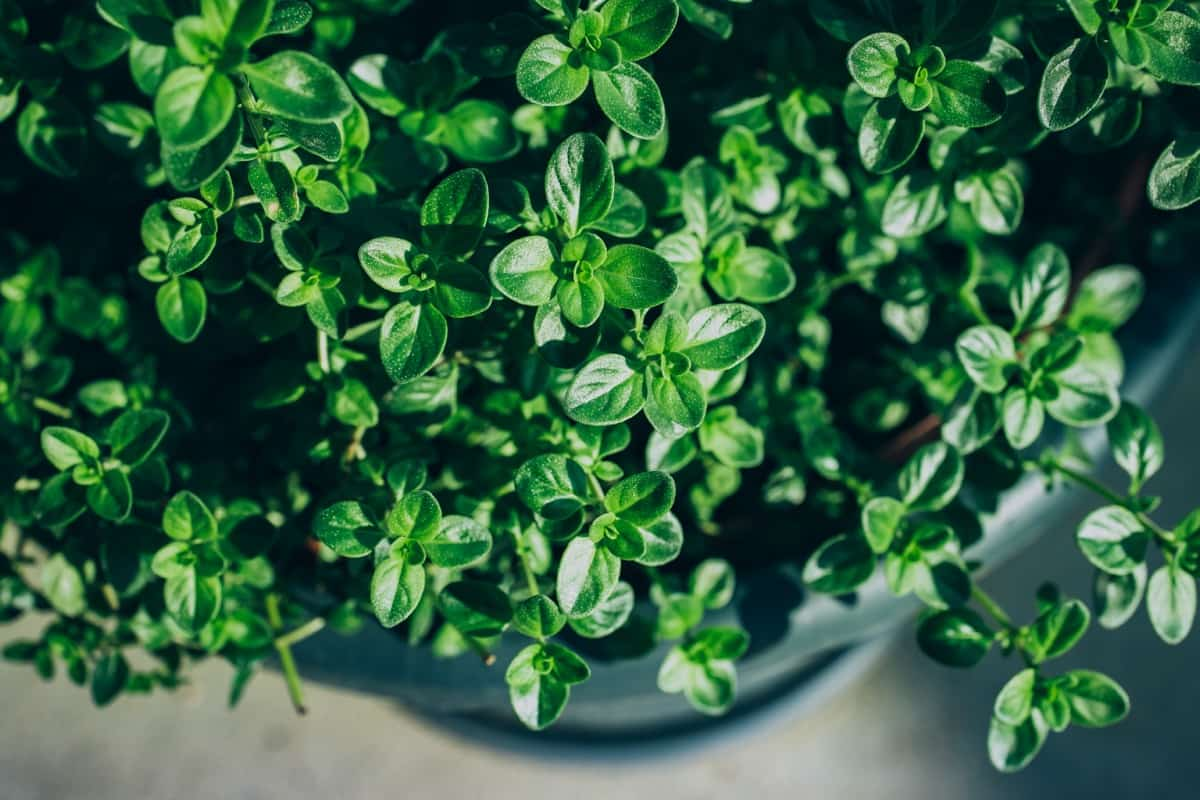
Not weeding
One of the most overlooked aspects of herb gardening is weeding. Weeds compete with your herbs for water and nutrients, stunting their growth. Also, weeds can harbor pests and diseases that can spread to your precious herbs. Even if you’re growing your herbs in pots inside, there’s still a chance that weed seeds could find their way into your potting mix.
You should check for weeds more frequently if you notice them sprouting up. Pulling them out by hand from the roots is best. Another great tip is to mulch around your herb plants with organic matter such as straw or wood chips. This will help suppress weed growth while providing additional nutrients for your herbs. Not weeding may seem like a minor mistake when it comes to herb gardening, but it can significantly impact your garden’s overall health and success.
Forgetting the Fertilizer
One of herb gardeners’ most common mistakes is forgetting to fertilize their plants. While herbs are generally low-maintenance, they still need nutrients to grow and thrive. Without proper fertilization, your herb plants may struggle to produce new growth or develop healthy leaves. Choosing a high-quality fertilizer designed for herb plants is important to avoid this mistake.
When applying fertilizer, be careful not to overdo it – too much fertilizer can harm your plants instead of helping them. Follow the instructions carefully and use as directed. Remember that fertilization needs may vary depending on the specific type of herbs you’re growing. Some herbs require frequent feeding, so check individual care instructions before adding fertilizer.
In case you missed it: 13 Herbs that Grow Best from Cuttings: A Must Grow Herbs List in Your Garden
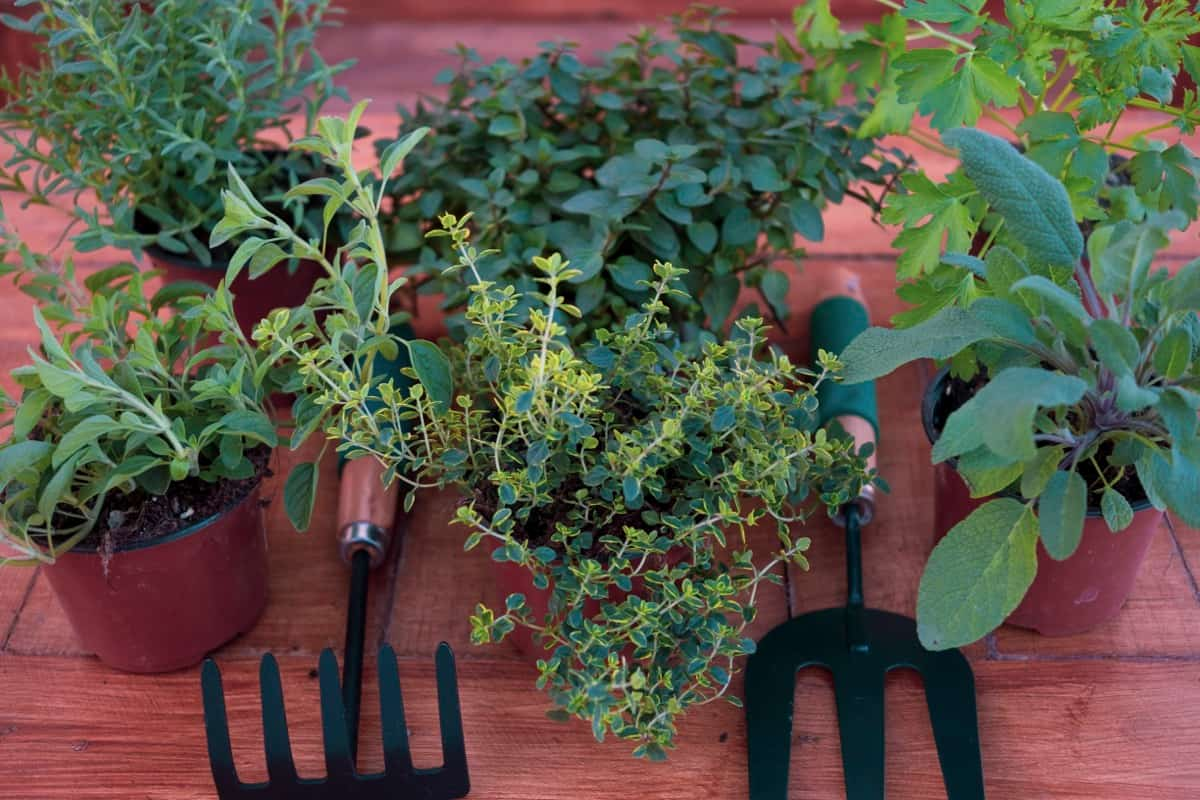
Conclusion
Growing an herb garden can be an enjoyable and rewarding experience. However, it’s essential to avoid these common mistakes that may cause your plants to wither or die. Herb gardening is a fun and rewarding activity that can benefit your life. By avoiding common mistakes, you will be well on your way to creating a thriving herb garden that provides delicious ingredients for all your culinary creations.
Remember to give your herbs plenty of sunlight, water them sparingly, plant them with enough space between each other, use proper soil drainage techniques and fertilizer, weed regularly, and enjoy the process. With these tips, you’ll have a bountiful harvest quickly.
- Cabbage Seed Germination and Selection
- Broccoli Seed Germination and Selection
- Asparagus Seed Germination and Variety Selection
- Seasonal Flower Gardening: Best Practices for Spring, Summer, Fall, and Winter
- How to Grow Hibiscus from Flower
- Plantation Ideas for Home Decoration: A Beginners Guide
- Flower Garden Designs and Layouts for Beginners
- Planting and Spacing Techniques in Papaya: A Beginner’s Guide
- Growing Gold: Essential Techniques for Planting Pineapples
- How to Make Kalanchoe Plant Bushy: Home Remedies and Solutions
- 11 Reasons Why Your Gardenia is Not Blooming: Home Remedies and Solutions
- Eco Elegance: The Guide to Designing a Drought-Tolerant Landscape
- Gardening on a Slope: Strategies for Hillside Landscaping
- Nourish and Flourish: Top Organic Mulches for Thriving House Plants
- Everything You Want to Know about Indian Mogra Flower: Discover Uses and Growing
- Green Thumb Success: Expert Tips for Cultivating Greenhouse Pumpkins All Year Round
- Maximize Growth & Flavor: The Ultimate Guide to Companion Planting in Herb Gardens
- How to Control Rhododendron Problems Naturally: Home Remedies and Organic Ways to Fix Them
- Natural Magic: The Remarkable Benefits of Cinnamon for Plants
- Best Steps to Revive Dying Tulip with Natural and Organic Treatment
- 10 Reasons Why Your Angel Trumpet is Not Blooming: Remedies and Treatment
- How to Fix Periwinkle Leaf and Flower-Related Problems: Natural Remedies and Solutions
- How to Fix Zinnias Leaf and Flower Problems: Discover Natural and Home Remedies
- Organic Steps to Induce Lemon Tree Flowers: A Comprehensive Guide
- Bloom Booster: Crafting the Perfect Homemade Bougainvillea Fertilizer
- Optimizing Growth: A Guide to Applying NPK Fertilizer for Potted Plants
- 10 Best Homemade Fertilizers for Rubber Plant: DIY Recipes and Application Method
- How to Boost Female Pumpkin Flowers: Effective Steps for More Flowers and High Yields
- Transform Your Indoor Garden: Top Benefits of Pink Salt for Houseplants
- 10 Best Homemade Fertilizers for Peacock Plants (Calathea): Easy DIY Guide
- Unlock Blooms: 9 Reasons Why Your Potted Chrysanthemum is Not Blooming
- 8 Reasons Why Your Potted Hibiscus is Not Blooming: Fix it with Simple Solutions
- Unlock Blooms: 9 Key Reasons Your Potted Frangipani Won’t Flower
- 10 Reasons Why Is My Ice Plant Not Blooming: Remedies and Treatment
- 10 Reasons Why My Potted Hydrangea Not Blooming: Treatment and Remedies
- 10 Reasons Why is My Wisteria Not Blooming: Remedies and Treatment